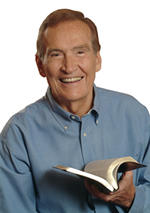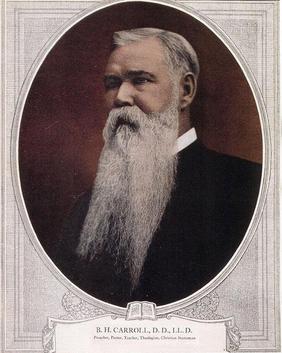Baptists form a major branch of evangelicalism distinguished by baptizing only professing Christian believers and doing so by complete immersion. Baptist churches generally subscribe to the doctrines of soul competency, sola fide, sola scriptura and congregationalist church government. Baptists generally recognize two ordinances: baptism and communion.

The Southern Baptist Convention (SBC), alternatively the Great Commission Baptists (GCB), is a Baptist Christian denomination based in the United States. It is the world's largest Baptist organization and the largest Protestant and second-largest Christian body in the United States. The SBC is a cooperation of fully autonomous, independent churches with commonly held essential beliefs that pool some resources for missions.
The Baptist Faith and Message (BF&M) is the statement of faith of the Southern Baptist Convention (SBC). It summarizes key Southern Baptist thought in the areas of the Bible and its authority, the nature of God as expressed by the Trinity, the spiritual condition of man, God's plan of grace and salvation, the purpose of the local church, ordinances, evangelism, Christian education, interaction with society, religious liberty, and the family.

The Southern Baptists of Texas Convention (SBTC) is an association of conservative Baptist churches in Texas, supportive of the Southern Baptist Convention and its entities. The Southern Baptists of Texas were formed by churches within the Baptist General Convention of Texas so that they might partner more closely with the national body in a fellowship based on a common, conservative commitment to the inerrancy of Scripture. As of 2011, it had approximately 2,300 affiliated churches.

The Baptist General Convention of Texas (BGCT), more commonly known as the Texas Baptists, is a Baptist Christian denomination in the U.S. state of Texas. It is affiliated with the Southern Baptist Convention and the Baptist World Alliance. Texas Baptist offices are located in the city of Dallas, though convention staff are located across the state. According to a denomination census released in 2023, it claimed 2,038,53 members and 5,375 churches

The Southwestern Baptist Theological Seminary is a Baptist theological institute in Fort Worth, Texas. It is affiliated with the Southern Baptist Convention. It was established in 1908 and in 2005 was one of the largest seminaries in the world. It is accredited by the Association of Theological Schools in the United States and Canada, the Southern Association of Colleges and Schools Commission on Colleges, and the National Association of Schools of Music to award diplomas and bachelor's, master's, and doctoral degrees.

John Smyth was an English Anglican, Baptist, then Mennonite minister and a defender of the principle of religious liberty.

Adrian Pierce Rogers was an American Baptist pastor and conservative author. He served three terms as president of the Southern Baptist Convention.
L. Paige Patterson is an American Baptist former administrator. He served as president of Southeastern Baptist Theological Seminary in Wake Forest, North Carolina, from 1992 to 2003, as president of the Southern Baptist Convention (SBC) from 1998 to 2000, and as the eighth president of the Southwestern Baptist Theological Seminary in Fort Worth, Texas, from 2003 until his firing in 2018 over mishandling of a rape allegation.

Richard D. Land was the president of Southern Evangelical Seminary in Charlotte, North Carolina, a post he held from July 2013 until his retirement in 2021.

Benajah Harvey Carroll, known as B. H. Carroll, was a Baptist pastor, theologian, teacher, and author.

Wallie Amos Criswell Jr., was an American Baptist pastor, author, and a two-term elected president of the Southern Baptist Convention from 1968 to 1970. As senior pastor of the First Baptist Church of Dallas for five decades, he became widely known for expository biblical preaching at a popular level, and is regarded as a key figure in the late 1970s "Conservative Resurgence" within the Southern Baptist Convention.

The Southern Baptist Theological Seminary (SBTS) is a Baptist theological institute in Louisville, Kentucky. It is affiliated with the Southern Baptist Convention. The seminary was founded in 1859 in Greenville, South Carolina, where it was at first housed on the campus of Furman University. The seminary has been an innovator in theological education, establishing one of the first Ph.D. programs in religion in the year 1892. After being closed during the Civil War, it moved in 1877 to a newly built campus in downtown Louisville and moved to its current location in 1926 in the Crescent Hill neighborhood. In 1953, Southern became one of the few seminaries to offer a full, accredited degree course in church music. For more than fifty years Southern has been one of the world's largest theological seminaries, with an FTE enrollment of over 3,300 students in 2015.
Russell Hooper Dilday was an American pastor, educator, seminary president, and chancellor of the B.H. Carroll Theological Institute. He was best known for his tenure as president of Southwestern Baptist Theological Seminary until his abrupt dismissal in 1994 during the Southern Baptist Convention conservative resurgence.

Morris H. Chapman was elected president and chief executive officer of the Southern Baptist Convention (SBC) Executive Committee on October 1, 1992. In September 2009 he announced that he would retire from this position effective September 30, 2010.
Harold Lindsell was an evangelical Christian author and scholar who was one of the founding members of Fuller Theological Seminary. He is best known for his 1976 book The Battle for the Bible.
Herman Paul Pressler III was an American politician and judge who was a justice of the Texas 14th Circuit Court of Appeals in his native Houston, Texas. Pressler was a key figure in the conservative resurgence of the Southern Baptist Convention, which he initiated in 1978. He was accused of sexual misconduct or assault by at least seven men, some of whom were underage at the time of the alleged activity.

W. Randall Lolley (1931-2022) was an American Christian clergyman of the Baptist tradition. His principal contribution to religious and academic life was a 14-year presidency (1974-1988) of the Southeastern Baptist Theological Seminary in the town of Wake Forest, North Carolina. Lolley's leadership of the seminary—one of six owned by the Southern Baptist Convention—ended as a result of theological and political strife within the denomination.

Jimmy Raymond Allen was an American pastor who was President of the Southern Baptist Convention (SBC) from 1977 to 1979. As president of the SBC, Allen was noted for his moderation and commitment to compassion in the church and was the last president before the SBC's conservative resurgence. After leaving his post as president, he continued to serve in the SBC before eventually becoming involved in other baptist organizations.